2016 Chemistry REU Offers Undergraduate Students a Glimpse of Grad Life
August 16, 2016
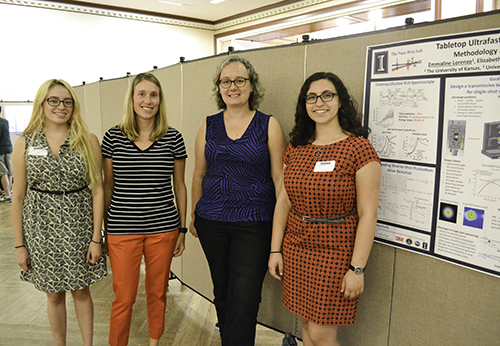 Left to right: Chemistry REU participant, Jasmine Davila; PI Alison Fout; co-PI Kami Hull; and REU participant, Emmaline Lorenzo at the Chemistry REU's end-of-the-summer poster session at the Illini Union.
Left to right: Chemistry REU participant, Jasmine Davila; PI Alison Fout; co-PI Kami Hull; and REU participant, Emmaline Lorenzo at the Chemistry REU's end-of-the-summer poster session at the Illini Union.This summer at Illinois, five undergraduate students were chosen to be a part of the Chemistry REU (Research Experience for Undergraduates) program to get a glimpse of what research in graduate school looks like. Allison Fout, the PI for this REU, which currently is solely funded by 3M, said that out of 270 applicants, only five were chosen. According to Fout, applicants were selected based upon the following criteria: “Their grades, their letters of recommendation, their experience. (You could really gain experience by coming here)" she adds. Plus, she indicates that the final criteria was: "students that were interested in pursuing chemistry in the future. All of those things were part of what we were looking at.”
In addition, they were looking for underrepresented students. "With 3M, they would like us to target underrepresented minorities" she explains. "That's part of the funding."
According to Fout, having an REU student in one's lab is beneficial to researchers in a number of ways. For one, the REUs bring a fresh enthusiam:
“Usually they are excited about being there and doing science," Fout explains. "So they bring a vibrant energy (that your lab has), but a new face bringing it and getting excited about the little things."
Fout says it's also a great way to recruit good students for graduate school. "The REU students, when they like it, and like their research, we recruit them for grad school, and we know we are getting a phenomenal student here for grad school."
In addition, Fout says it also lets more people know about the research going on in Chemistry at Illinois. "We’re training them, so when they go back, they talk about their experience. When they go to conferences, they talk about their experiences. So science is getting out to a larger number of people.”
While the lab and science community benefit from REU students, these students also got a lot out of their experience at Illinois. Fout goes on to say that “My biggest thing for them to take out is that they experienced scientific research, and they know that if they go to grad school, they know what they’re going to do. And so if you go around and talk to them, I heard 'Grad school,' 'Grad school,' 'Grad school,' and then, 'No, med school!' It just kind of depends. Now they know what this is about. Earlier they were on the fence; now they know.”
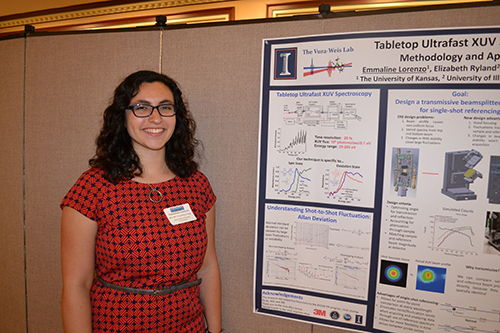
Chemistry REU participant, Emmaline Lorenzo, presents her findings about her research, Ultrafast XUV Spectroscopy.
Emmaline Lorenzo
One undergrad who has definitely decided on graduate school is Emmaline Lorenzo, a rising junior at the University of Kansas, who says that this experience, “Confirmed for me that I do want to go to grad school.” She indicates that she “got a really good look at what it’s like to be in grad school.”
Lorenzo says she participated in the Chemistry REU in order to learn something new: "I work in a similar group back home," she explains, "but this was an opportunity to go somewhere new and pick up new techniques.
Lorenzo definitely learned some new techniques: "The spectroscopy is a lot different because with extreme ultraviolet, everything has to be under a vacuum. That complication adds another dimension to it."
Finally, deciding on grad school and learning about new spectroscopy techniques weren't the only benefits for Lorenzo.
“I’ve gained a lot of lab and technical skills," she admits. "I didn’t realize in physical chemistry how important design, coding, and computer skills are, so I picked up a lot of that.
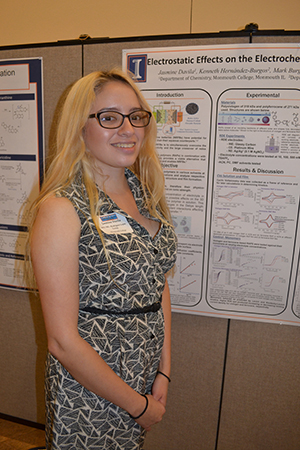 Chemistry REU participant, Jasmine Davila, presents her research findings during the poster presentation session.
Chemistry REU participant, Jasmine Davila, presents her research findings during the poster presentation session.Jasmine Davila
Lorenzo wasn’t the only student to pick up additional skills from the REU, Jasmine Davila, a rising senior at Monmouth College in Illinois, acknowledged that she picked up some practical, personal skills.
“As a student I think I learned a lot about time management. Just because different experiments took a different amount of time, and I wanted to plan it out so I didn’t end up missing lunch or dinner. Also just analyzing the data takes a lot of time, on excel even. I got a lot of computer skills out of it and my PowerPoint skills are also sharper. We did group meeting presentations every Friday. My presentation skills are better. I also know how to make a poster.”
When asked to describe her research Davila explained “It was electrochemically characterizing redox reactive polymers using RDE… We got some pretty good results. A lot of data. Things that are publishable.” This REU experience also helped Davila with her plan for the future and admitted “When I came in here over the summer, I wasn’t sure if I wanted to do grad school or med school, or MDPHD, but now I’m definitely thinking med school, but I will apply to some MDPHD programs.”
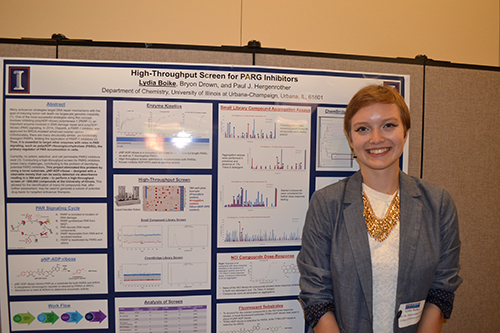
Chemistry REU participant, Lydia Boike, waits to discuss her research at end-of-the-summer poster presentation.
Lydia Boike
Another student who similarly researched in a medically-based field was rising junior Lydia Boike, who attends the College of William and Mary in Virginia. This summer she was working on an enzyme that could help cure cancer. When asked to describe this enzyme, Boike explains:
“The enzyme I worked with over the summer is called PARGUE. It’s a DNA repair enzyme. So in cancer, often times, cancer cells have high rates of mutation and there are enzymes that repair those mutated cells normally, so it just makes sense that if you want to make a drug for cancer that maybe you would want to target an enzyme that repairs damage because if you can get rid of that enzyme then you have a cancer cell that has lots and lots of enzymes, and then the tumor cells will die and that’s exactly what you want. Your normal cells don’t have such high rates of mutation and isn’t necessarily terrible if you are taking a medicine that inhibits this enzyme, but it’s bad for your cancer cells that you can’t repair all the mutations and then they will die.”
In regards to the results of the research, Boike says that “Right now we are at the stage where we are doing this response for our hit compounds, and right now we can’t confidently say that we have the compound that is THE compound, but I’m very hopeful that eventually this project will.”
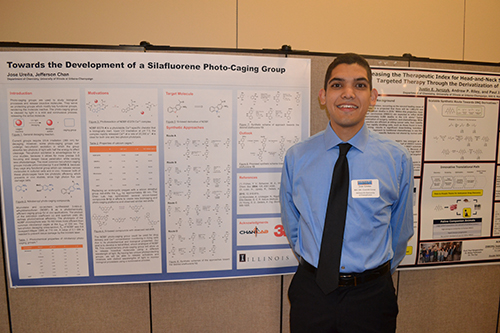
Chemistry REU participant, Jose Ureña, displays his poster at the poster presentation.
Jose Ureña
Not only did the Chemistry REU offer a glimpse of what research in graduate school would be like, it gave the undergraduate students a glimpse of what it would be like at a highly ranked school such as the University of Illinois. Rising senior Jose Ureña of Millers University in Pennsylvania came to this REU because of this reason.
“The University of Illinois is a top ten school in organic chemistry," he stated, "so I thought I would learn a lot and network and meet a lot of new people.”
The REU lived up to his expectations and in response to what he gained from this REU as a student he described:
“I got a really good insight into a top ten grad school. Just the learning environment overall, and then interacting with the PI’s, whether they’re associate professors or tenured professors. The amount of work you will be doing is just very different than the expectations. I also got the opportunity to network and work on a project all summer that culminates in a presentation. That’s very rewarding.”
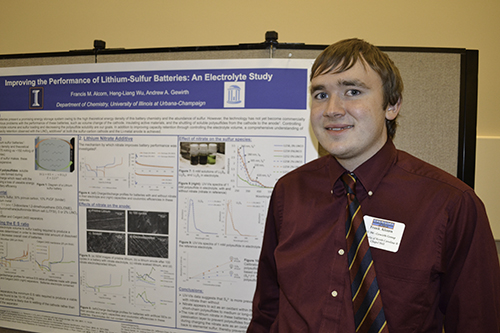
Chemistry REU participant, Francis Alcorn from University of North Carolina-Chapel Hill, waits to present his research at end-of-the-summer poster presentation.
Francis Alcorn
Francis Alcorn from University of North Carolina-Chapel Hill also came into the REU with hopes of new experiences. He says he came to the REU this summer “To experience something new, learn some chemistry. Coming in, I didn’t know much about electrochemistry, but here I’ve learned a lot. I don’t think it’s something I will likely pursue, but maybe I will apply it to other fields of chemistry.”
Alcorn describes his research this summer as “Working on lithium silver batteries… It is a promising battery chemistry due to its theoretical capacity which is ten times higher than lithium ion batteries.” While Alcorn does not believe he’s going to continue down the path of electrochemistry, he is now “hoping to use that knowledge [about electrochemistry] and apply it to other projects.”
Because all five Chemistry REU students seemed to have had significant exposure to scientific research and have taken another step toward deciding what they want to do in the future in regards to education, it appears that the Chemistry REU achieved its goal for the program.
Story by Alexandra Anne Peltier, I-STEM undergraduate student. Photos by Elizabeth Innes, Communications Specialist, I-STEM Education Initiative
For more related stories, see: Chemistry, Funded, REU, REU: Chemistry, Summer Research, Undergrad, Underserved Students/Minorities in STEM, 2016
For additional articles about 2016 REUs, see:
- Undergrads Consider Nanotechnology Careers Thanks to nano@illinois REU
- Undergrads in Bioimaging REU Experience What Research, Graduate School Is Like
- Wendy Reyes Learns Life Skills—and to Like Research—in Bioimaging REU
- Bioimaging REU's Matt Kavanaugh Experiences Cancer Research at Illinois
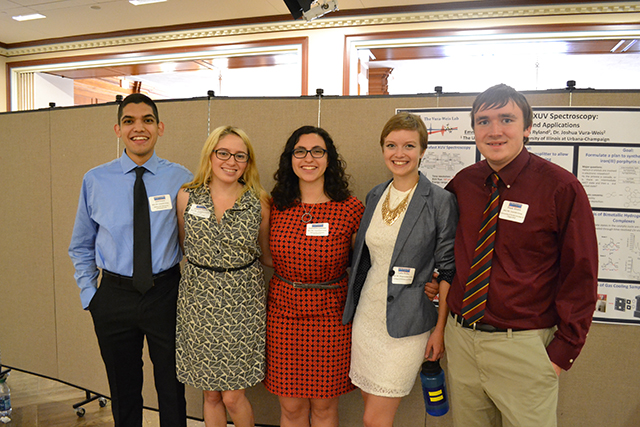
The five members of the 2016 Chemistry REU program (left to right): Jose Ureña, Jasmine Davila, Emmaline Lorenzo, Lydia Boike, and Francis Alcorn.













.jpg)
















